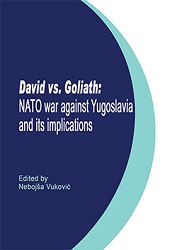NATO ROAD TO SERBIA: WHY 1999?
NATO ROAD TO SERBIA: WHY 1999?
Author(s): Slobodan Janković
Subject(s): Politics / Political Sciences, International Law, Security and defense, Military policy, EU-Approach / EU-Accession / EU-Development, Geopolitics, Peace and Conflict Studies
Published by: Институт за међународну политику и привреду
Keywords: Serbia; NATO; Europe; U.S.; Kosovo
Summary/Abstract: How NATO found its new raison d’être after the dissolution of the Warsaw Pact in the Yugoslav crisis? Why Serbia and the Serbs were designated as bad guys? How the initial NATO and USA policy determined the sides in the war, and how it affected the U.S. policy in Europe are the questions raised and answered in this article. The author starts with the historical introduction of the Yugoslav crisis and wars in the territory of the dissolved nation. He presents the main differing views on these processes among scholars and explains how their attachment to governmental policies affects their portrayal of events. Afterward, the author examines the European and global context in which the crisis and the subsequent aggression of the NATO Alliance on a small Balkan state occurred. Different interests in Berlin, Washington, London and the Vatican led to common action against a pariah state of the 1990s. What prevailed is the Anglo Saxon influence in the Balkans and in the EU.
Book: DAVID vs. Goliath : NATO war against Yugoslavia and its implications
- Page Range: 155-176
- Page Count: 22
- Publication Year: 2019
- Language: English
- Content File-PDF

